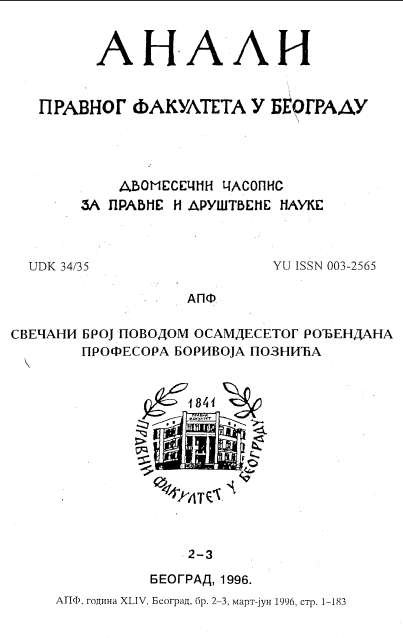ОБИЧНА ИНТЕРВЕНЦИЈА У ПАРНИЧНОМ ПОСТУПКУ (упоредноправни преглед и југословенско право)
SIMPLE INTERVENTION IN THE LITIGATION PROCEDURE (Comparative Review and Yugoslav law)
Author(s): Vesna Rakić-VodinelićSubject(s): Comparative Law
Published by: Правни факултет Универзитета у Београду
Keywords: Simple intervention; Litigation procedure; Effect of judgment on the third person; Differences in approach in European continental and Anglo-American laws
Summary/Abstract: The subject matter of the present contribution covers the review of a comparative law nature concerning the conditions for the simple intervention, the kinds of intervention, and the effects of the judgment regarding the simple intervening party. The simple (secondary) intervening party implies a third person voluntarily taking part in a litigation after having an interest of his own in succeeding at the court of one of the litigant parties termed as principal (original) parties. In spite of differences regarding the requirements for the intervention by a third person, in terms of comparative law, one may still conclude that European continental laws and the Anglo-American laws recognize the right of intervention to a third person having a legal interest relating to a specific litigation, provided such interest emanates out of substantive-law connection between the third person and one or both of the original parties to the case. The basic difference between the European continental laws, on the one hand, and the Anglo-Americal laws, on the other, as far as reqirements for the intervention are concerned, consists, in the case of the former laws, in the fact that the third person should only have a legal interest which does not need to result into an independent claim aimed against one or both of the parties. In the Anglo-American model, however, an independent claim of the intervening third person is necessary. Therefore in the Anglo-American laws, the intervening party has the capacity of a litigant, so that his (her) participation creates a new litigation. On the other hand, according to the solution in the European continental laws, a simple and voluntary intervening party ordinarily does not have the capacity of a litigating party, namely, he (she) may have it only as an exception. The ratio legis of the intervention discussed in the article relates to the need of a third person to influence the substance of the judgment, since it may bind him directly (after acquiring the capacity of a party, or after being a party), or it may bind him in an indirect way (so-called intervention effect). The binding character of a judgment regarding the intervening party is eliminated in the European continental laws by way of the two following methods: by an objection claiming unconscionable proceeding, and through an extraordinary legal remedy applied by the third person. Yugoslav law does not contain norms covering the intervention effect of the judgment, and the objections claiming unconsionable proceeding in the litigation, so that this legal lacuna is eliminated by analogous application of the solution found in German positive law. The author considers that this is justified since the requirements for the simple intervention and the position of the simple intervening party are almost identical in both systems of law.
Journal: Анали Правног факултета у Београду
- Issue Year: 44/1996
- Issue No: 2-3
- Page Range: 120-139
- Page Count: 20
- Language: Serbian

